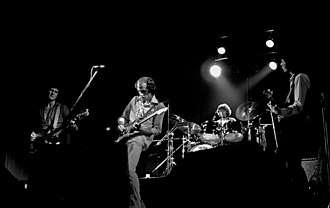
Dire Staits turned a modest barroom tale into one of rock’s most enduring anthems.
When Dire Straits released “Sultans of Swing” in 1978, few could have predicted that the song would help launch one of the most successful rock bands of the late 20th century. The single, written by frontman Mark Knopfler, stood out for its clean guitar tone, vivid storytelling, and understated confidence. It became the centerpiece of the band’s self-titled debut album and remains one of the most recognizable songs in modern rock history.
Dire Straits was formed in London in 1977 by Knopfler, his brother David Knopfler, bassist John Illsley, and drummer Pick Withers. The group began as a pub band, playing small clubs around England while developing a sound that blended rock, jazz, and blues influences. Their music avoided the heavy production and volume that dominated the late 1970s, favoring clarity and musicianship over flash. “Sultans of Swing” captured that approach perfectly.
The song tells the story of a working bar band performing for a small, distracted audience. Its lyrics are grounded in realism rather than fame or glamour. Knopfler was inspired after watching a struggling group play in a nearly empty pub in South London. He transformed that moment into a portrait of musicians who perform for the love of their craft, even when few are listening. That theme—pride in musicianship over popularity—struck a chord with listeners around the world.
Musically, the song is driven by Knopfler’s unique fingerpicking guitar style, which gives the track its fluid, conversational tone. Instead of using a pick, Knopfler plucked the strings directly, producing a clean and melodic sound that became his signature. Critics often describe his playing on “Sultans of Swing” as precise yet expressive, combining technical skill with emotional restraint.
Initially recorded on a low-budget demo tape costing about £175, the song began gaining attention when local radio stations started to play it. The BBC soon picked it up, and it became a surprise hit, reaching the top ten in both the U.K. and U.S. charts. The success of “Sultans of Swing” helped the band secure a record deal with Vertigo and set the stage for a career that would eventually include global tours, multiple Grammy Awards, and more than 120 million albums sold.
The band’s later work included hits such as “Romeo and Juliet,” “Tunnel of Love,” and “Money for Nothing,” which cemented Dire Straits’ reputation as one of the defining British rock acts of the 1980s. But many fans and critics still view “Sultans of Swing” as the song that best represents their essence—a masterclass in storytelling and musicianship that rewards repeated listening.
Today, the track continues to be a staple of classic rock radio and live cover performances. Its influence can be heard in generations of guitarists who cite Knopfler as a key inspiration. In an era before digital production and social media, the song’s success relied entirely on word of mouth, musicianship, and a simple truth that still resonates: good songs find their audience naturally.
“Sultans of Swing” endures not because it chases trends, but because it captures something timeless about why people make music in the first place. It celebrates craft, humility, and the joy of playing for its own sake—a quiet anthem for every musician who has ever picked up an instrument and kept going, whether the room was full or nearly empty.
Sources:
- KEXP
- BBC Music Archives.
- Rolling Stone Magazine.
- Warner Music Group
Image licensed under the Creative Commons Attribution-Share Alike 2.0 Generic license. Author: Heinrich Klaffs



 New Music Monday: Defying the Cold Snap with the Latest Cuts from Friday's Countdown
New Music Monday: Defying the Cold Snap with the Latest Cuts from Friday's Countdown
 How Rush's "Tom Sawyer" Defined a Legend and Ignited a 50-Year Legacy
How Rush's "Tom Sawyer" Defined a Legend and Ignited a 50-Year Legacy
 Arctic Monkeys Return with "Opening Night": A New Chapter for the Sheffield Icons
Arctic Monkeys Return with "Opening Night": A New Chapter for the Sheffield Icons
 Muskoka’s Own Hitmaker: New Biography on Marc Jordan
Muskoka’s Own Hitmaker: New Biography on Marc Jordan
 Hometown Legends Take the World Stage: Green Day Set for Santa Clara Homecoming
Hometown Legends Take the World Stage: Green Day Set for Santa Clara Homecoming













Comments
Add a comment